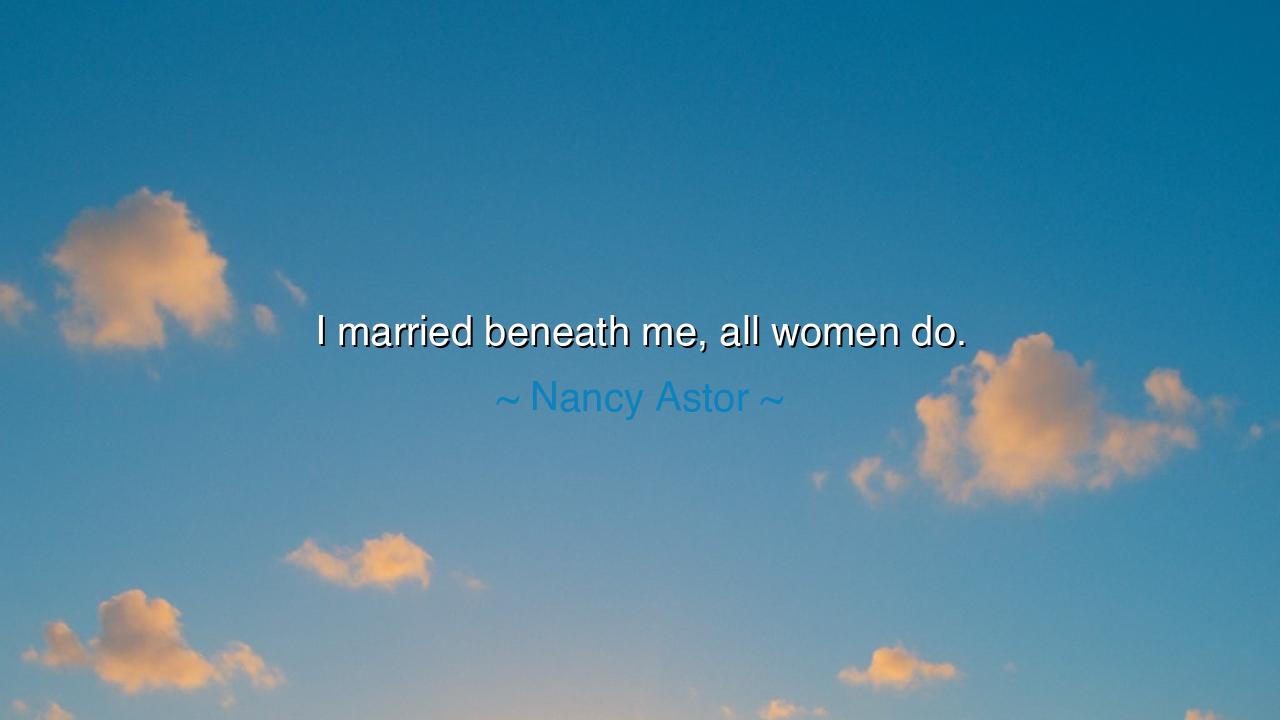
I married beneath me, all women do.






The words of Nancy Astor—“I married beneath me, all women do.”—are wrapped in wit but burn with truth. On the surface, they sparkle with humor, the kind that makes listeners laugh before they realize they’ve been struck by insight. Yet beneath the jest lies a bold declaration of self-worth and a quiet lament for the imbalance that has long marked the union between men and women. In her time, and even in ours, Astor’s words ring as both defiance and prophecy—a reminder that women have often been greater in spirit, endurance, and wisdom than the world has been willing to admit.
To understand the origin of this quote, we must remember who Nancy Astor was: the first woman to take a seat in the British Parliament, a pioneer in an age when women were only beginning to find their voices in the chambers of power. She lived in a world ruled by men who were raised to command and women who were expected to yield. Yet Astor, sharp of mind and fearless of tongue, refused to bow to that order. Her remark, delivered with laughter, was in truth a rebellion in disguise. For when she said she had “married beneath” her, she was not mocking her husband alone—she was mocking a society that had long demanded that women marry down in power so that men might feel elevated.
Her words strike at a deeper truth of the human spirit: that for ages, women have carried the unseen labor of civilization. They have nurtured, sustained, and guided the world while standing in the shadows of men who claimed the glory. It is not arrogance that speaks in Astor’s quote, but weariness wrapped in wit—a sigh turned into laughter. She knew that many women, brilliant and capable, found themselves confined to roles that did not reflect their worth. To “marry beneath” was not always a choice, but a reflection of the narrow world they were forced to inhabit.
Consider the story of Abigail Adams, wife of John Adams, the second President of the United States. She was his counselor, his conscience, his equal in intellect and vision. In her letters, she warned him, “Remember the ladies.” And though he admired her wisdom, the laws of the age denied her power. She governed from the hearth what she could not command in the hall. History remembers John’s presidency, but it is Abigail’s foresight that whispers through time, for her spirit spoke not only to her husband but to the generations of women who would follow. Like Nancy Astor, she knew the truth: that often, the strength of women has been veiled beneath the names of men.
Yet, even as Astor’s words sting with irony, they carry a kind of reverence for womanhood. To say that all women “marry beneath them” is not to condemn men, but to elevate the unseen virtues of women—their compassion, patience, and wisdom, qualities often dismissed as weakness but which are in truth the foundations of enduring strength. It is as if she were saying: men may build empires and write laws, but it is women who teach mercy to power and grace to justice. In this sense, to marry beneath is not humiliation, but the quiet nobility of those who give more than they receive.
But there is also a challenge hidden in her words. Astor invites us to look beyond laughter and see the task that remains unfinished. The imbalance between men and women—in respect, in recognition, in freedom—cannot be righted until both stand as equals in the truest sense. Marriage, partnership, and society itself must evolve from hierarchy into harmony. A world in which either gender must stoop to meet the other is one not yet wise, not yet whole.
The lesson, then, is this: honor does not flow from title or power, but from integrity of soul. If you are a woman, let Astor’s words remind you that your worth is not measured by the world’s approval, but by the strength of your spirit. If you are a man, let them stir in you humility and reverence for the quiet majesty of those who have so long walked beside you, unseen yet steadfast. Let marriage—and all human partnership—be no longer a ladder of dominance, but a bridge of equals.
And so, remember the wit and wisdom behind Nancy Astor’s jest. It is a mirror held to both pride and prejudice, laughter laced with truth. In her voice echoes the laughter of all the women who refused to be diminished, who knew that to marry beneath was not a mark of arrogance but an act of endurance. Let her words guide us toward a future where no one must rise or bow to meet another—where man and woman, in spirit and in love, walk side by side as equals in the light.






AAdministratorAdministrator
Welcome, honored guests. Please leave a comment, we will respond soon